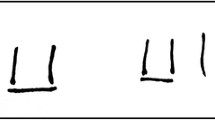Abstract
This study addressed one aspect of scientific reasoning, the control of variables reasoning scheme. We explored whether a short intervention aimed at accelerating this reasoning scheme by CASE lessons would improve students’ ability to apply this scheme in problems related to the biology curriculum. About 120 students from grade nine were assessed for their Piagetian cognitive level and were divided into two groups, control or intervention. A short intervention of three sessions took place in the intervention group only. Both groups were then instructed on the topic of enzymes according to the biology curriculum and undertook a final exam. The results showed that only 20% of the population acquired the Piagetian formal operations level, in line with previous findings. In addition, it was found that the short intervention had a significant effect on students’ ability to use the control of variables reasoning scheme.
Similar content being viewed by others
References
Adey P (2005) Issues arising from the long-term evaluation of cognitive acceleration programs. Res Sci Educ 35:3–22
Adey P, Shayer M (1994) Really raising standards. Routledge, London
Adey P, Shayer M, Yates C (2001) Thinking science, vol 3. Nelson Thornes, Cheltenham
Anderson CW (2007) Perspectives on science learning. In: Abell SK, Lederman NG (eds) Handbook of research on science education. Lawrence Erlbaum, Mahwah, NJ, pp 3–30
Arons AB, Karplus R (1976) Implications of accumulating data on levels of intellectual development. Am J Phys 44:386
Babai R (2008) Piagetian cognitive level and the tendency to use intuitive rules when solving comparison tasks (Manuscript submitted for publication)
Bullock M, Ziegler A (1999) Scientific reasoning: developmental and individual differences. In: Weinert FE, Schneider W (eds) Individual development from 3 to 12: findings from the Munich longitudinal study. Max Plank Institute for Psychological Research, Munich, pp 38–54
Case R (1974) Structures and strictures: some functional limitations on the course of cognitive growth. Cognit Psychol 6:544–573. doi:10.1016/0010-0285(74)90025-5
Chen Z, Klahr D (1999) All other things being equal: acquisition and transfer of the control of variables strategy. Child Dev 70:1098–1120. doi:10.1111/1467-8624.00081
Duit R (2007) Students’ and teachers’ conceptions and science education: a bibliography, full version March 2007. Retrieved from http://www.ipn.uni-kiel.de/aktuell/stcse/stcse.html
Endler LC, Bond TG (2001) Cognitive development in a secondary science setting. Res Sci Educ 30:403–416. doi:10.1007/BF02461559
Endler LC, Bond TG (2008) Changing science outcomes: cognitive acceleration in a US setting. Res Sci Educ 38:149–166. doi:10.1007/s11165-007-9042-0
Huppert J, Michal Lomask S, Lazarowitz R (2002) Computer simulations in the high school: students’ cognitive stages, science process skills and academic achievement in microbiology. Int J Sci Educ 24:803–821. doi:10.1080/09500690110049150
Inhelder B, Piaget J (1958) The growth of logical thinking from childhood to adolescence. Routledge, London
Iqbal HM, Shayer M (2000) Accelerating the development of formal thinking in Pakistan secondary school pupils: achievement effects and professional development issues. J Res Sci Teach 37:259–274. doi:10.1002/(SICI)1098-2736(200003)37:3<259::AID-TEA3>3.0.CO;2-W
Karplus R, Karplus E, Formisane M, Paulsen AC (1979) Proportional reasoning and control of variables in seven countries. In: Lochhead J, Clement J (eds) Cognitive process instruction, research on teaching thinking skills. Franklin Institute Press, Philadelphia, PA, pp 47–103
Kuhn D, Garcia-Mila M, Zohar A, Andersen F (1995) Strategies of knowledge acquisition. Monogr Soc Res Child Dev 60:1–128 (Serial no. 245, no. 4)
Lawson AE (1985) A review of research on formal reasoning and science teaching. J Res Sci Teach 22:569–617. doi:10.1002/tea.3660220702
Lawson AE, Renner JW (1975) Piagetian theory and biology teaching. Am Biol Teach 37:336–343
Lazarowitz R (1992) High school students’ difficulties in biology concepts. J Biol Educ 26:215–224
Mbano N (2003) The effects of a cognitive acceleration intervention programme on the performance of secondary school pupils in Malawi. Int J Sci Educ 25:71–87. doi:10.1080/09500690110110124
Mullis IVS, Martin MO, González EJ, Chrostowski SJ (2004) TIMSS 2003 international mathematics report: findings from IEA’s trends in international mathematics and science study at the eighth and fourth grades. Boston College, Chestnut Hill, MA
National Research Council (1996) National science education standards. National Academy Press, Washington, DC
Piaget J, Inhelder B (1974) The child’s construction of quantities. Routledge and Kegan Paul, London
Schauble L (1996) The development of scientific reasoning in knowledge-rich contexts. Dev Psychol 32:102–109. doi:10.1037/0012-1649.32.1.102
Shayer M, Adey P (1981) Towards a science of science teaching. Heinemann Educational Books, London
Shayer M, Adey P (2002) Learning intelligence. Open University Press, Buckingham
Shayer M, Wylam H (1978) The distribution of Piagetian stages of thinking in British middle and secondary school children II: 14–16-year-olds and sex differentials. Br J Educ Psychol 48:62–70
Shayer M, Kuchemann DE, Wylam H (1976) The distribution of Piagetian stages of thinking in British middle and secondary school children. Br J Educ Psychol 46:164–173
Shayer M, Demetriou A, Pervez M (1988) The structure and scaling of concrete operational thought: three studies in four countries. Genet Soc Gen Psychol Monogr 114:309–375
Shayer M, Ginsburg D, Coe R (2007) Thirty years on—a large anti-Flynn effect? The Piagetian test volume & heaviness norms 1975–2003. Br J Educ Psychol 77:25–41. doi:10.1348/000709906X96987
Shemesh M, Lazarowitz R (1988) The interactional effects of students’ cognitive levels and test characteristics on the performance of formal reasoning tasks. Res Sci Technol Educ 6:79–89. doi:10.1080/0263514880060107
Shemesh M, Lazarowitz R (1989) Pupils’ reasoning skills and their mastery of biological concepts. J Biol Educ 23:59–63
Wollman W (1977) Controlling variables: assessing levels of understanding. Sci Educ 61:371–383. doi:10.1002/sce.3730610312
Author information
Authors and Affiliations
Corresponding author
Rights and permissions
About this article
Cite this article
Babai, R., Levit-Dori, T. Several CASE Lessons Can Improve Students’ Control of Variables Reasoning Scheme Ability. J Sci Educ Technol 18, 439–446 (2009). https://doi.org/10.1007/s10956-009-9161-7
Received:
Accepted:
Published:
Issue Date:
DOI: https://doi.org/10.1007/s10956-009-9161-7




